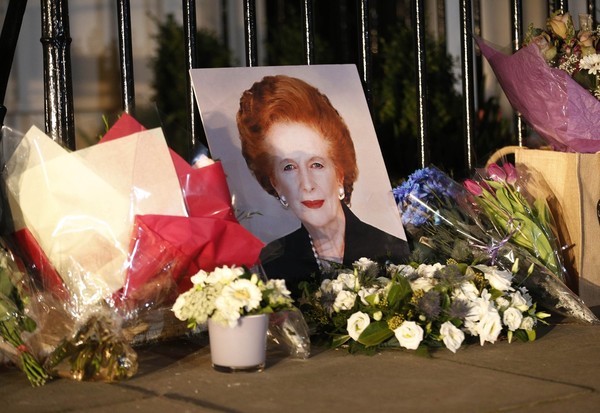
Abandon civility, all ye who enter here.
I always wonder how long it will take after a famous person dies for critics to pounce. It would seem that common courtesy would allow at least a few days -- perhaps after the funeral. But common courtesy is sorely lacking.
It's not necessarily because we have more discourteous people today; indeed, "civil" society has never been all that civil. However, primarily because of the Internet, what is different today is that everything is so in-your-face. Social media, perhaps most notoriously Twitter, and the 24-hour news cycle, combined with our collective short attention span, have created a culture that lacks reflection. We get bumper sticker slogans from talking heads instead of serious news "analysis," and the pundit who can provide us with the most obnoxious sound bite is rewarded with the most TV time. This is this societal milieu in which we find ourselves.
It was announced at 12:55 p.m. London time on Monday that Margaret Thatcher, the first female Prime Minister of the UK, passed away. She was a transformative figure, whose governing philosophy -- often referred to as "Thatcherism" -- permanently changed the UK and influenced other countries around the globe. Her accomplishments and failings have been detailed extensively elsewhere, so we need not recount them here. As would be expected of any powerful leader, she engendered both deep admiration among supporters and equally deep animosity among critics.
World leaders, including former rival prime ministers, have graciously expressed their sympathies. Alas, this moment of solidarity was not shared by all.
At 3:41 p.m., not even four hours after Thatcher had died, Glenn Greenwald put together an incoherent article for The Guardian explaining how it is perfectly acceptable to speak ill of the dead if they are public figures. In fact, to not do so is "dangerous" and "irresponsible" because:
Demanding that no criticisms be voiced to counter that hagiography is to enable false history and a propagandistic whitewashing of bad acts, distortions that become quickly ossified and then endure by virtue of no opposition and the powerful emotions created by death.
In other words, influential leaders are fondly remembered by society because criticism is socially unacceptable in the immediate aftermath of their death. In Greenwald's twisted world, a person's legacy is sealed in the week or so after they die -- not during the several previous decades in which they were alive, not to mention the years and years of historical analysis (and reanalysis) that inevitably ensue.
Logic continues to evade Greenwald the further he goes. He writes:
She played a key role not only in bringing about the first Gulf War but also using her influence to publicly advocate for the 2003 attack on Iraq ... She was a steadfast friend to brutal tyrants such as ... Saddam Hussein.
In the same paragraph, Greenwald manages to criticize Thatcher both for being a friend and enemy of Saddam Hussein. Perhaps the only explanation for this is TDS, "Thatcher Derangement Syndrome."
At 5:30 p.m., other pathetic souls, apparently suffering from the same syndrome, handed out slices of "Maggie Death Cake," and a theater in Brixton had its sign changed to read, "Margaret Thatchers Dead LOL." Another protester hung a banner that read, "The Bitch is Dead."
Celebrating like that may be appropriate (though still mildly distasteful) for the death of, say, Osama bin Laden. But Margaret Thatcher? And, thanks to the Internet, the whole world got to see all of this disgusting behavior -- not even six hours after she died.
Being gracious toward those whom we dislike is not a common trait, yet several world leaders (many of whom strongly disagreed with Thatcher) were able to do just that. Perhaps this is one of the incredibly rare moments in life when our elected politicians are actually serving as responsible role models.
Alex B. Berezow is the editor of RealClearScience and associate editor of RealClearWorld. Follow him on Twitter @AlexBerezow.
(Image: AP)











